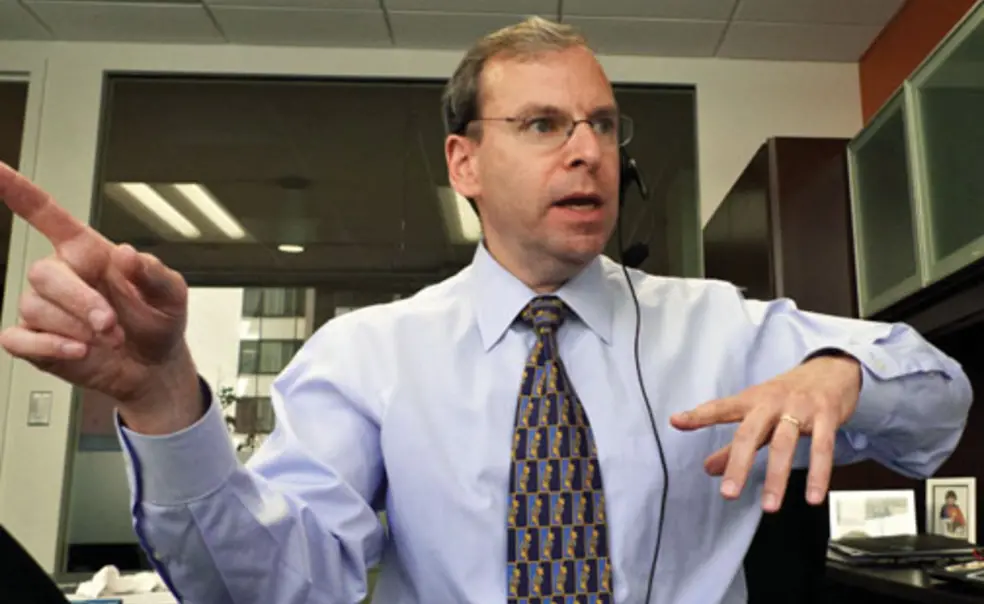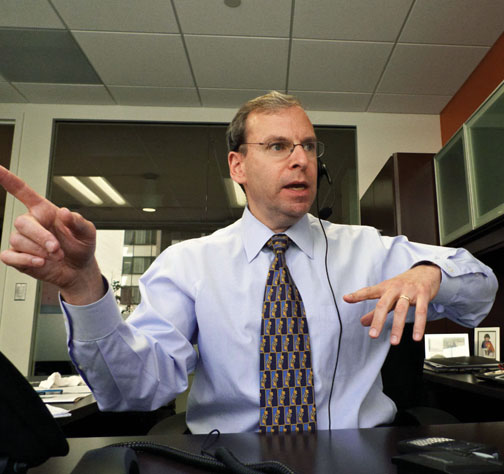Jeremy Ben-Ami '84, on speaking out about Israel
Jeremy Ben-Ami ’84 has shaken up the American Jewish community — and his own extended family — by founding J Street, a lobbying group with a left-of-center stance toward the Middle East, a small but growing political-action committee, and a mission “to change the dynamics of American policy,” he says. In July, the then-15-month-old organization was one of 12 Jewish groups invited to meet with President Obama.
Ben-Ami — a veteran of the Clinton White House — has drawn both praise and fierce criticism for expressing positions rarely heard from major Jewish organizations. On Jerusalem, J Street supports a two-state solution in which Jewish neighborhoods would fall under Israeli sovereignty and Arab neighborhoods would be under Palestinian sovereignty, with negotiations to resolve especially difficult issues such as control of the holy places. It wants an immediate and total freeze of settlement construction. PAW interviewed Ben-Ami at his office in Washington, D.C., in August. He will speak at Princeton Nov. 17.
Your family has a long history of involvement in Israel. Tell us about that.
My great-grandparents and grandparents immigrated in the 1880s from what today is Russia. They built some of the first houses in Tel Aviv. My father was part of the Israeli independence movement, the Irgun. He was a terrorist. He raised money for the cause, but also fought. [The Irgun] blew up buildings, used violence for political purposes, and believed they had legitimate reasons. He was in jail, but was never actually convicted. After independence, he continued to be deeply engaged in Israeli and worldwide Jewish politics. It was coursing through my veins from an early age.
You lived in Israel in the 1990s. What did you learn?
The thing I gathered most from the Israeli side was the breadth of acceptable debate — how wide the disagreements were within the Israeli Jewish family. People shout at each other, but they’re clearly on the same side.
Do family members today see you as a black sheep?
There are people in my family who warmly embrace me, and people who think I am working against the legacy of my father and the interests of Israel.
How much support does your view have among American Jews?
Look at two national polls of Jewish-American opinion. They found that a majority of American Jews favor a two-state solution, are opposed to an expansion of settlements, and support the idea that the U.S. needs to be an active leader in diplomatic efforts to resolve the conflict. We have to build a megaphone large enough to carry that voice.
Has there been a strong backlash?
The level of vitriol is really astounding. I understand there are differences in opinions and that we deliberately started an argument, because one had to be had.
What common ground do you share with other Jewish groups?
A love for and support for the state of Israel and a real, deep concern about its security and future. I think we share an interest and commitment to the rock-solid relationship between the U.S. and Israel and the commitment by us to its security.
I believe that the single greatest threat to the future of Israel as a democratic home for the Jewish people is the failure to resolve the conflict with the Palestinians. If it is not resolved, Israel’s existence as a Jewish democracy is at stake.
How do you respond to those who say American Jews have no business telling Israel what to do?
What happens over there affects us deeply over here — as Americans, because our interests are at stake, too, and as American Jews, because the future of the state of Israel will have a big impact on our community and on how other people relate to our community.
Some of your critics believe that while American Jews often discuss differences among themselves, they should speak with one voice when it’s time to express a policy position.
What’s the advantage of speaking with one voice on this complex issue? And who says that the only voice that should be heard is the more conservative one? Politicians have been led to believe not that there’s a division in the community, but that there really is only one set of views. That’s had an impact on policy that is unfortunate. They need to know that there is a diversity of opinion and that they have the political space to follow the path they think best serves U.S. interests — and Israel’s.
— Interview conducted and condensed by Louis Jacobson ’92













No responses yet